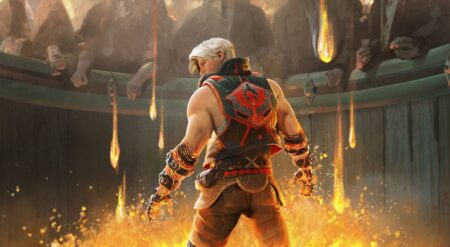
Mythic Quest is truly one-of-a-kind. Sure, it’s a workplace dramedy, and we’ve seen many before, but it manages to capture a balance of humor and stunning emotion in every episode. Centered on a game studio developing the titular game “Mythic Quest,” the series follows characters as they navigate game development. In season 2, the MQ crew is focused on creating the next big expansion, and while it has a name, “Titan’s Rift,” it’s not anywhere close to being complete. By showcasing the development process from creative director to monetization, testing, and more, the series has been able to take a holistic approach to showcase the gaming industry with an authentic lens and it’s that lens that makes the series work.
The series co-writer and co-creator Megan Ganz explained, “we did a ton of research season 1, but this year we tried to delve into how the video game world is adjusting to remote working, to the life that we’ve all known for the past year….” She continued, “we’ve been trying to chase that authenticity since the beginning.” And that authenticity in the workplace has made the series a favorite, but beyond that, it’s the series’ authentic approach to characters through their growth that makes it really stand out. If the series just showcased how work life and normal situations stretched to absurdity, it would certainly still be hilarious, thanks to the writing from veterans Ganz, Charlie Day, and Rob McElhenney. But what makes Mythic Quest stand out is the deep emotional moments baked into characters and their relationships. Emotion and vulnerability, or the push back against it, is the driving force of Mythic Quest Season 2.
While the writers on the series know how to make us feel things—looking at you “Dark Quiet Death”—it’s how they do it that makes the series grab viewers. To put it simply, the characters, regardless of their tropes, change—they grow. That is the heart of the series; much like how games shift and change over time, so do people. In Mythic Quest Season 2, we get the chance to see the resident killjoy from monetization, Brad, show new parts of himself. Brad is the asshole of the workplace, but he isn’t without a heart.
“It’s fun to play a character that does not care what other people think about him. In this world, there is this friction between someone who sees the product as a product and creatives. It was really appealing for me to play as an actor because I can say terrible things to people and not care what they think about it,” Danny Pudi explained. “But at the same time, Brad does have a soul and a heart, really deep deep deep down. You got to really dig, and then you got to dig some more, and then you might find something. But it’s ticking down there.” And Mythic Quest Season 2 does dig deep.
Over the course of the season, we get the chance to see more of Brad than ever before. Pushed by his brother and Jo, Brad’s asshole exterior is called into question. Suddenly, we get the chance to look back at Brad’s past decisions and see that not all of them were grounded in shrewd logic. Instead, some exposed his soft side, and even in the series finale when he takes the blame for Jo, it’s not just for his bad boy street cred, but clearly because of his kind of heart.
Brad isn’t the only employee changing this season, so are the Testers, Rachel and Dana, played by Ashly Burch and Imani Hakim. This season, we get to see the two take their relationship to the next level and reach beyond their existing roles as QA Testers on the MQ Team. “What’s cool too about Dana and Rachel in season 2, I think is that we get to see them spread their wings a little bit and sort of dip their toes into what does life outside being a QA Tester look like,” Burch said, explaining the questions that the pair of Testers begin to ask themselves.
“Okay, do we want to do this for the rest of our lives? what are our aspirations beyond this?” she continued. “But as they venture out of their roles, the series makes sure not to count Testers out.” As Hakim explained, “they’re unsung heroes of the gaming industry.” In truth, the shift away from being Testers is handled with care, keeping the job’s importance but also showing that some people use the role to expand into more creative elements of development. Both characters live this. Drawn to QA from a love of games, this season, we get to see Dana embrace her passion and push forward to create them. And while Dana pulls from her love of gaming, Rachel pulls from her love of story, of pulling people in and taking them on a journey. Burch added, “we’re ambitious, and we want to see what else is out there for us in this industry.”

Continuing with the theme, C.W. also has a journey this season that changes him. Sure he’s still the kind of offensive older generation figuring out how to navigate a new generation’s world, but he’s anything but stagnant. He listens to those around him, and in episode 7 of the season, he allows Rachel to be his guide and teach him, even if he isn’t aware of it. On his character, F. Murray Abraham said, “what [C.W.] represents I think is one of the magic things about this show. You really never expected this kind of character in this world. And the idea that the way [Ashley and Imani] who I admire so much, personally as well as the characters they play – they represent something that is very dynamic in this culture right now and very rare.”
Abraham continued, “What [Rachel and Dana] represent is a dynamic that is living, and it infects C.W. as well. He is not dead, he is not over the hill. In fact, he’s changing too, and their changes are affecting his life, and what he’s going through is affecting his life.” C.W.’s journey this season is not only emotional, but as Murray Abraham explained, something we see happening now, and something that needs to continue—the older generation learning from the younger. And while his growth as a character is centered on looking back on the mistakes he made decades ago, it also reflects Poppy and Ian’s relationship, leaving viewers to hope they can correct their rift.
And that’s the important thing about Mythic Quest; it’s not just positive growth either—at least not at first. Mythic Quest has been able to showcase characters who change negatively as well. For example, in season 2, we get the chance to see Poppy turned into a character more insufferable than the narcissistic Ian. But there’s a reason to it. As a viewer, we’ve got the chance to see Poppy move from an engineer charged with bringing Ian’s idea to life to a boss on his level. But that much change, especially when you’re used to feeling voiceless, can have a negative impact. And that change is key to each and every character’s humanity.

On her character, actress Charlotte Nicdao explained, “One of the things I had the most fun exploring in season 2 is that throughout season 1, Poppy had this really clear goal. And that’s that she wants to have creative control over the game that she helps to make. Now in season 2, she has that creative control, and there is a whole bunch of road bumps for her to overcome personally and in her working relationship with Ian. It was really important for us to show that she is a flawed person. She’s not this perfect beacon; sometimes, we want women to be perfect. But I really love that Poppy has a lot of things in her that are a challenge, and we get to explore that a lot.”
Poppy’s journey in season 2 is one that speaks to me. She isn’t on a power trip because she’s a bad person; she’s on one because she’s terrified of failing. As her character moves through the season, she has a conversation with Ian where she’s asked to admit her fear, and she can’t. It’s almost like speaking it into the world will make it true. But once she opens up to him, she’s able to confront it and ultimately adjust her behavior. In this way, Mythic Quest captures the reality of life. How it throws your confidence into a tailspin, raises it, and how you have to learn to manage those highs and lows.
Nicdao added, “The thing that is interesting is that I think that she’s always had as big of an ego as Ian; it’s just that Ian’s ego for his whole life was allowed to run rampant. Whereas Poppy’s ego was stuffed down and told to be quiet. In season 2, she’s finally allowed to let her ego run rampant. What I want people to see in the story are the times that that ego doesn’t serve her, but also the times where it really does. Where having confidence in what she can create and what she’s singularly capable of is a really important part of her success.”
Mythic Quest is a perfect series, and it is such because it balances comedy astutely against emotion. It works and resonates with viewers because it allows for characters to change, to grow, and to become different versions of themselves. And while it isn’t always easy, showcasing depth is important because that’s who we are as people. So while it’s easy to think of the authenticity that MythicQuest aims for as just showing gaming correctly, it’s also about showing people in a genuine way. That’s the magic, and that’s why we watch.
Mythic Quest Season 2 is available now on Apple TV+.






